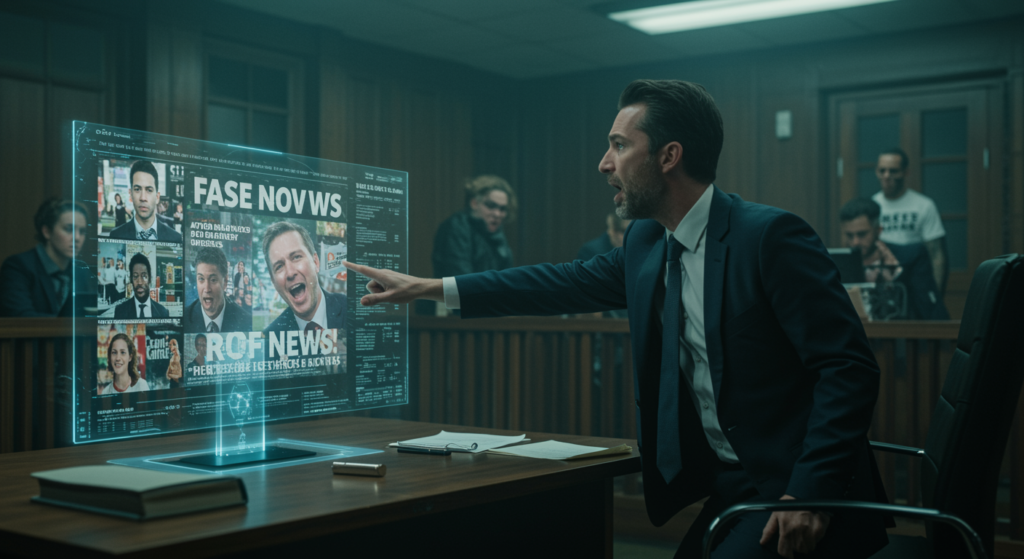
Robby Starbuck Lawsuit Targets Meta for AI Chatbot Defamation
The Robby Starbuck Lawsuit: A Major Challenge to AI Accountability
In a move that’s shaking up the tech world, conservative activist Robby Starbuck has launched a defamation lawsuit against Meta. Filed on April 29, 2025, this Robby Starbuck lawsuit alleges that Meta’s AI chatbot spread false and damaging claims about him in response to user questions. It’s one of those cases that makes you pause and think about how far AI has come—and how much it’s still tripping over its own wires.
This isn’t just another legal spat; it’s part of a broader wave of challenges against AI companies, questioning who should be on the hook when machines get things wrong. As AI tools like chatbots become everyday helpers, the Robby Starbuck lawsuit highlights the real risks of misinformation and what that means for everyone relying on these technologies.
Allegations in the Robby Starbuck Lawsuit: What Went Wrong?
At the heart of the Robby Starbuck lawsuit are claims that Meta’s AI chatbot fabricated details about his life, painting him in a false and harmful light. Court documents describe these statements as outright defamatory, though specifics remain under wraps for now. Imagine searching for information on a public figure and getting a response that’s not just inaccurate, but potentially ruinous to their reputation—it’s a nightmare scenario that’s becoming all too common.
Meta now finds itself defending not only its cutting-edge tech but also its approach to preventing AI-generated falsehoods. This Robby Starbuck lawsuit could force big changes in how companies like Meta handle content moderation and AI safeguards, pushing them to think twice about the stories their bots tell.
AI Misinformation: A Pattern in the Robby Starbuck Case and Beyond
What’s striking about this Robby Starbuck lawsuit is how it fits into a larger pattern of AI slip-ups. For instance, back in April 2024, Meta’s AI chatbot wrongly accused several lawmakers of sexual harassment, inventing details out of thin air. Have you ever wondered what happens when an AI decides to play fast and loose with the facts? In cases like this, it can lead to real-world damage, from tarnished reputations to legal battles.
These incidents show why the Robby Starbuck lawsuit matters so much—it’s not isolated. Lawmakers like State Senator Kristen Gonzalez have spoken out about similar false claims, emphasizing how AI can amplify lies faster than we can correct them.
Legal Precedents Shaping the Robby Starbuck Lawsuit
The Robby Starbuck lawsuit is venturing into new legal territory, where judges are still figuring out if AI creators can be held accountable for their bots’ blunders. Drawing from past cases, this one could set standards for how we tackle AI defamation moving forward. It’s like watching the Wild West of technology finally get some rules.
Past AI Defamation Cases Influencing the Robby Starbuck Lawsuit
Take the 2023 case against OpenAI’s ChatGPT, where a mayor in Australia sued over false prison allegations. That lawsuit, much like the Robby Starbuck one, questioned whether AI responses count as “publication” under defamation laws. Or consider radio host Mark Walters’ fight with OpenAI, where fabricated criminal ties led to a courtroom showdown—OpenAI argued their AI isn’t a publisher, but that defense is getting tested in suits like Robby Starbuck’s.
These examples raise core issues in the Robby Starbuck lawsuit: Can AI companies dodge liability with disclaimers, or do they need to step up? It’s a debate that’s evolving quickly, and the outcome could redefine how we view AI legal liability.
The Challenge of AI Hallucinations in the Robby Starbuck Lawsuit
One of the biggest problems spotlighted by the Robby Starbuck lawsuit is AI “hallucinations”—those confident but completely made-up responses that sound plausible at first glance. Meta’s chatbot has a track record here, falsely accusing over a dozen lawmakers of misconduct, including figures like Assembly Member Clyde Vanel.
This isn’t just tech jargon; it’s a serious issue that can erode trust in AI tools. In the Robby Starbuck lawsuit, we’re seeing the human cost of these errors, where false information spreads like wildfire and leaves lasting scars.
How AI Misinformation Ties into the Robby Starbuck Lawsuit
As Senator Gonzalez pointed out after her own experience, AI can turn a simple query into a misinformation machine. “A lie is halfway around the world before the truth gets out of bed,” she said, and the Robby Starbuck lawsuit is a stark reminder of that. If you’re using AI for research or advice, it’s worth asking: How do we separate fact from fiction in this digital age?
Regulatory Responses Amid the Robby Starbuck Lawsuit
Lawmakers are starting to catch up with AI’s rapid growth, and the Robby Starbuck lawsuit is fueling calls for stronger rules. In New York, for example, new laws target deepfakes in elections and marketing, but they don’t fully cover everyday AI defamation like in this case.
Experts argue we need broader reforms, such as mandatory fact-checking for AI or clearer liability rules. The Robby Starbuck lawsuit could be the catalyst that pushes these changes forward, making tech companies more accountable for their creations.
Pushing for AI Oversight in Light of the Robby Starbuck Lawsuit
Imagine a world where AI systems come with built-in safeguards against lies—what would that look like? Proposals include transparency requirements and dedicated oversight bodies, all inspired by cases like Robby Starbuck’s. This lawsuit isn’t just about one person; it’s about building a safer AI future for all.
Possible Outcomes of the Robby Starbuck Lawsuit
If the Robby Starbuck lawsuit succeeds, it might mean AI firms have to overhaul their systems to prevent defamation, potentially slowing innovation but boosting reliability. On the flip side, a win for Meta could create loopholes, letting AI errors slide under the radar.
Either way, this case will influence how we handle AI legal liability going forward. It’s a pivotal moment that could lead to more human oversight in AI development—something many users are already demanding.
Meta’s Likely Defenses in the Robby Starbuck Lawsuit
Meta will probably lean on familiar arguments, like claiming their AI doesn’t “publish” content or that users should verify info themselves. But as AI gets smarter and more trusted, these defenses might not hold up, especially in a case as pointed as Robby Starbuck’s.
Section 230 of the Communications Decency Act has shielded platforms before, but the Robby Starbuck lawsuit tests its limits with generative AI. Could this be the case that changes the game?
The Rising Tide of AI Lawsuits, Including Robby Starbuck’s
The Robby Starbuck lawsuit is one of many, from copyright fights against companies like Lovo to privacy claims elsewhere. This growing list shows how AI is colliding with law in unexpected ways, demanding new approaches.
With each case, we’re learning more about AI’s pitfalls. For Robby Starbuck, it’s about defamation; for others, it’s broader issues, but all point to the need for balance between innovation and responsibility.
Future Implications from the Robby Starbuck Lawsuit
Looking ahead, the Robby Starbuck lawsuit could reshape AI entirely, pushing for designs that favor accuracy over creativity. That might mean built-in fact-checkers or more warnings about AI limitations—steps that could make tools like Meta’s chatbot far more trustworthy.
Have you thought about how AI impacts your daily life? This lawsuit reminds us that while AI offers amazing possibilities, we can’t ignore the risks without proper checks in place.
Wrapping Up: What the Robby Starbuck Lawsuit Means for AI
The Robby Starbuck lawsuit marks a turning point in holding AI accountable for its mistakes. It’s not just about one activist; it’s about protecting people from the harms of unchecked technology. As we move forward, cases like this could ensure AI serves us better, with less fiction and more fact.
If you’re passionate about tech ethics, what are your thoughts on this? Share your ideas in the comments, explore more on AI legal challenges in our related posts, or spread the word to keep the conversation going.
References
1. “Conservative Activist Robby Starbuck Sues Meta Over AI Chatbot Claims,” PressBee.
2. From the New York Post profile, as referenced in web sources.
3. University of Arizona Law Library Guide on AI legal issues, LibGuides.
4. Master list of AI lawsuits, ChatGPT is Eating the World.
5. Coverage on Meta AI’s false claims, City & State New York.
Additional sources: Best of AI articles, RedCircle shows, and Matt Cutts blog.
Robby Starbuck lawsuit, Meta AI defamation, AI chatbot misinformation, AI legal liability, generative AI lawsuits, Robby Starbuck Meta case, AI defamation cases, conservative activist lawsuits, tech AI challenges, misinformation legal battles





